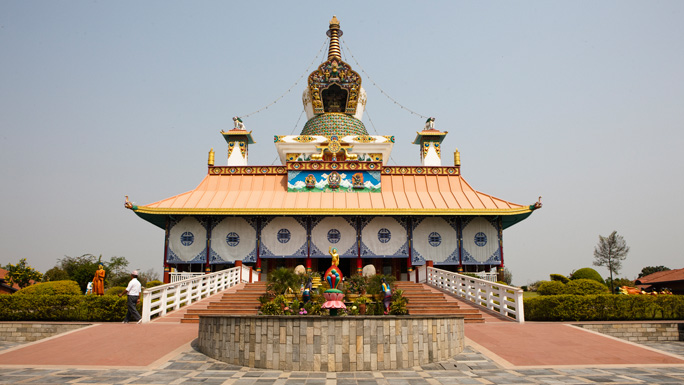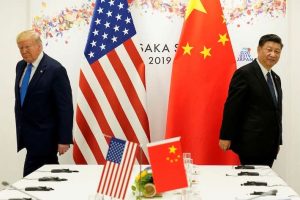“Beware of Greeks bearing gifts” – that was Laocoon’s warning in relation to the wooden horse, packed with soldiers, that the Greeks tricked the Trojans into taking into their besieged city.
Put another way, it is prudent to ask why someone makes a gift of something to you for no apparent reason.
The people of Nepal do need to ponder this question in the light of the assistance that China is giving, for example, in the form of restoring temples destroyed in the 2015 earthquake.
The relationship of donor and recipient in the sphere of foreign aid is rife for exploitation by the party making the donation. It creates an unequal distribution of power.
Only the most naïve of politicians would regard foreign aid as entirely altruistic. Regrettably, Nepal has a long history of such innocents.
Ever since the country overthrew the Rana family oligarchy, it has been a prime target for foreign influencers.
The late King Mahendra was a brilliant negotiator who pitted opposing countries against each other so that they vied to match or outdo their opponents.
The Americans built a cableway so the Russians built a cigarette factory; the Indians built a road from India, so the Chinese built a road from Tibet, and so on. Cleverly, the King played one off against the other so that Nepal was always the net beneficiary.
All the interested parties were so invested in combating the influence of each other that precious little thought was given to any quid pro quo from the beneficiary country itself.
But after Mahendra’s death, no Nepalese politician has had the skill to play this game. The result has been to turn the country into an aid-dependent state, with the sickening sight of supplicant ministers going cap-in-hand to potential donors.
Battle to Win Nepal’s Friendship (and UN Vote)
In the ongoing battle between China and India to cultivate Nepal’s friendship – not to mention its vote in the United Nations – accepting China’s offer to restore the major temples and architectural sites of historical importance was a major coup for Beijing.
Visitors to reconstruction sites in the ancient cities of Kathmandu, Patan and Bhaktapur cannot fail to see the notices announcing that the restoration work is the gift of China, or observe the Chinese personnel manning these sites.
But there ain’t such a thing as a free lunch.
The beneficiaries of China’s apparent largesse are expected to demonstrate simpering gratitude and, above all, subscribe to the omni-perfection of the Chinese Communist Party.
The Kathmandu Post, one of Nepal’s leading English-language newspapers offended China’s pitiful hypersensitivity to anything Beijing perceives as criticism, especially of its political system.
Secrecy, Unreliable Data, Hypersensitivity
The paper published a syndicated opinion article by Ivo Daalder which pointed out, accurately, that China’s systemic secrecy and control meant that there was a critical delay before there was official recognition of the outbreak of Covid-19.
The article also questioned the reliability of data about the spread of the virus being released by China.
With a touch of irony, China’s Supreme Court had to berate the officials who had hauled Dr Li Wenliang before the police for his “illegal acts of fabrication, spreading rumors and disrupting social order.”
What the heroic Dr Li had done was to bring the outbreak of the virus to the attention of fellow medics.
It is a fact that the Chinese Communist Party tries to control the dissemination of any news that reflects badly on its management of the country, even when that means suppressing vital information about a potentially lethal disease.
Judged by China’s own Supreme Court, Daalder’s article was factually accurate and his opinion wholly justifiable. Dr Li Wenliang did not fabricate anything, it was not rumour but truth and his objective was done for the public’s benefit.
For publishing this article, the Kathmandu Post was attacked by the Chinese Ambassador to Nepal, who described it as “a picture of malicious intention” and a “vicious attack on the Chinese political system.”
Not content with that, the ambassador threatened the editor, Anup Kaphle, that he would take further action against him, describing him as “a parrot of some anti-China forces”.
China’s habitual hypersensitivity to criticism, particularly when well- directed and accurate, is water off a duck’s back to any advanced economy, but when it is seen against the background of a major aid program donor to a developing country, it takes on a more sinister colour.
Aid Recipients Must Obey
Beneficiaries of Chinese state aid, in any form, should keep in mind that the Chinese Communist Party does not countenance free speech for its people and expects, nay demands, similar obedience from recipients of its benevolence.
It is critical to understand Beijing’s mindset. They believe that the only way to govern a land mass of China’s size and its 1.4 billion population is to maintain strict, non-discriminate control. Even more disturbing is the belief that the rest of the world is out of synch in not following the same credo.
For what China regards as a tinpot Himalayan recipient of its aid to permit unlicensed criticism of the perfection of the Party, is to wound deeply its amour propre.
Objectively, it does make one wonder why on earth the world’s second-largest economy cannot treat such criticism as a flea bite on an elephant’s hide.
The image of tight-suited, hair-dyed ambassadors jumping up and down like so many Rumplestiltskins, as they fulminate against their critics, is hilarious, hardly adding to their gravamen as diplomats.
But this sort of nonsense should act as a warning to Nepal not to get itself in hock to China – or any other heavy-handed neighbour – without first considering the potential ramifications of the debt being called in.
In the 19th century, India was flooded with missionaries peddling Christianity in return for food, creating generations of “curry rice Christians”. Nepal needs to beware of an influx of Chinese bearing the gifts of aid without strings.
The Belt and Road Initiative looks as though it has become the “Belt-up and follow our road” – or else.
Neville Sarony QC is a noted Hong Kong lawyer with more than 50 years at the Bar.
NOTE: This report was updated to adhere to AF’s new layout style on August 12, 2022.
























